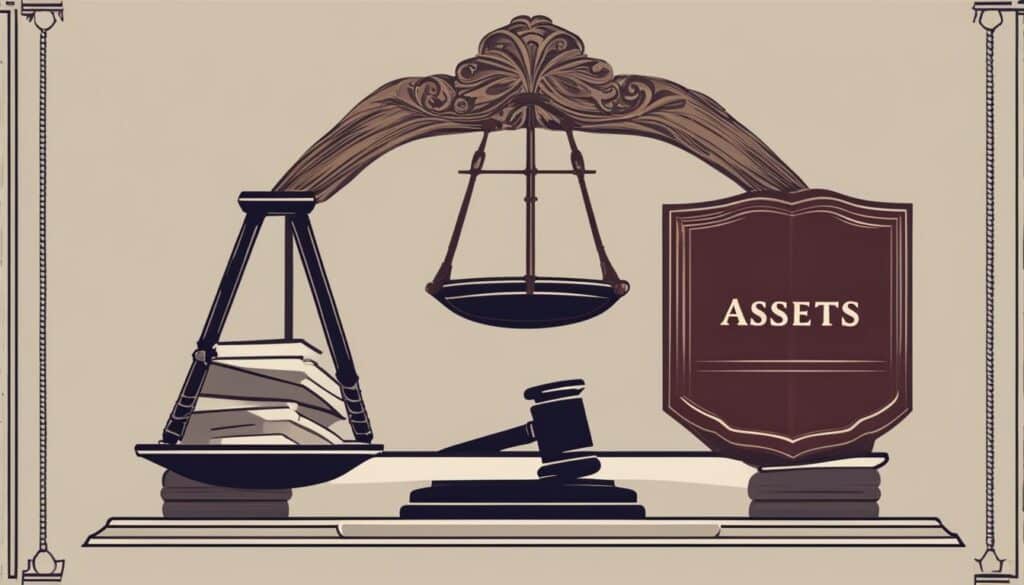Protecting one’s wealth is a legitimate concern, especially during legal proceedings such as divorces. However, it is crucial to approach asset concealment strategies and wealth protection from legalities in an ethical and law-abiding manner. Engaging in tactics to secure wealth discreetly and securing assets legally can set the foundation for a fair division of assets and protect your interests during times of transition. Additionally, understanding judgement-proof asset planning
The Legal Implications of Concealing Assets During Divorce
Full asset disclosure plays a crucial role in reaching an equitable divorce settlement. By law, both parties must list all of their assets during the divorce proceedings, allowing judges to review this inventory for determining spousal support based on financial capabilities and the standard of living throughout the marriage. However, concealing assets disrupts this process and can result in adverse court decisions regarding alimony and child support.
The Role of Full Asset Disclosure in Equitable Divorce Proceedings
Divorce proceedings require complete transparency from both parties. Full asset disclosure is necessary to guarantee a fair division of marital assets, with judges relying on this information to evaluate the appropriate spousal support and child maintenance arrangements.
As such, hiding assets from judgement goes against the legal principle of equitable divorce proceedings. When one party conceals assets, the court may not be able to accurately determine the financial abilities and necessities of each spouse. This situation can lead to skewed support agreements that might not reflect each party’s actual financial condition.
Consequences of Hiding Assets for Spousal Support and Legal Sanctions
Concealing assets during a divorce not only compromises equitable asset distribution but also carries legal repercussions. Some consequences of hiding assets include court-ordered sanctions, being required to pay the other party’s legal fees, increased alimony payments, and potential criminal fraud charges.
Complying with full disclosure requirements is essential for a fair and legal division of marital wealth. Adhering to this principle will prevent any unfavorable consequences during the divorce process and ensure that both parties achieve a fair outcome.
In conclusion, understanding the legal implications of concealing assets during a divorce is crucial for all parties involved. By disclosing all relevant assets and working together to reach an equitable settlement, divorcing couples can avoid negative consequences and foster a smoother, more amicable separation process.
Understanding Asset Classification: Marital vs. Separate Property

Accurately differentiating between marital and separate assets is pivotal in a divorce. In general, marital assets are those acquired between the date of marriage and the date of separation, and they are subject to division during the divorce. On the other hand, separate assets are those acquired before marriage or received as gifts or inheritance during the marriage, and they are typically exempt from division during the divorce process.
How Different Types of Assets are Treated in Divorce
The treatment of assets in divorce is largely determined by whether the assets are classified as marital or separate property. Examples of marital assets include:
- Real estate purchased or substantially paid off during the marriage
- Vehicles acquired during the marriage
- Bank accounts and investment accounts opened and funded during the marriage
- Retirement accounts accumulated during the marriage
- Businesses started or managed during the marriage
On the other hand, examples of separate assets include:
- Real estate, vehicles, or other property acquired before the marriage
- Inheritances and personal gifts received during the marriage
- Financial accounts and investments designated as separate property through a prenuptial or postnuptial agreement
- Compensation received for personal injuries sustained during the marriage, except for lost wages or medical expenses
It is essential to accurately identify and classify all assets as either marital or separate to ensure an equitable division of property in the divorce settlement. Misclassification or hiding of assets from judgement can lead to legal repercussions and, ultimately, an unfair resolution for all parties involved.
Strategies for Identifying Hidden Assets and Income

Uncovering hidden assets and income during divorce proceedings is crucial for achieving a fair and equitable division. Identifying these concealed financial holdings can be challenging, but there are various strategies and legal tools that can assist in the process. These methods involve discovery motions, disclosure of financial records, inspection of property, and the use of sworn testimony through depositions and interrogatories.
One common approach involves discovery motions, where divorce attorneys file formal requests with the court to compel the other spouse to provide specific financial records or information. This can include bank account statements, investment portfolios, tax returns, business financials, and other records that may expose hidden assets or income sources.
Carrying out inspections of property is another effective strategy for unearthing concealed assets. This entails examining properties owned by the spouse to assess their value accurately and detect any indicators of hidden assets. An inspection might reveal the existence of physical securities, collectibles, or other valuable assets that were not disclosed initially.
Depositions and interrogatories are two legal mechanisms that can compel a spouse to provide sworn testimony regarding their finances. Depositions involve a formal, in-person interview conducted by a divorce attorney, where the spouse must answer questions about their financial holdings, under oath. Interrogatories, on the other hand, are written questions submitted to the opposing spouse that require comprehensive, verified written responses. These legal tools can help expose inconsistencies in a spouse’s financial disclosures, uncover hidden assets, and gain a clearer understanding of their financial situation.
In summary, these strategies play a crucial role in the process of identifying hidden assets and income during divorce proceedings. By utilizing discovery motions, property inspections, and sworn testimony through depositions and interrogatories, divorce attorneys can ensure that all assets are disclosed, allowing for a fair and equitable distribution of marital wealth.
The Use of Forensic Accounting in Divorces

Dealing with forensic accounting in divorce cases has become increasingly important to ensure a fair distribution of assets. Having a forensic accountant on your team is essential in complex divorce proceedings, as they can provide an expert analysis of assets and help in revealing concealed wealth that a spouse may have attempted to hide.
How Expert Analysis Can Reveal Concealed Wealth
Forensic accountants are specialists in analyzing financial records and detecting discrepancies that might indicate hidden assets or income. Using their advanced skills, they can trace cash flows, review tax returns, examine bank statements, and evaluate business records to uncover any inconsistencies that could signify an attempt to hide wealth.
Some of the techniques employed by forensic accountants include:
- Identifying unreported income through cash transactions, offshore accounts, or in-kind payments.
- Scrutinizing transfers of assets to third parties or family members that could indicate an attempt to conceal ownership.
- Finding discrepancies in property valuations or appraisals to reveal concealing of valuable assets.
- Detecting patterns of financial transactions that suggest manipulation of income or expenses.
In addition to conducting financial investigations, forensic accountants can also be invaluable during divorce proceedings by providing expert testimony in court. Their assessments and findings can help judges make a more informed decision when dividing assets, particularly in high-net-worth divorce cases with complex financial portfolios.
Ultimately, engaging a forensic accountant in your divorce process enhances your ability to uncover any undisclosed assets, leading to a more equitable distribution of wealth and a greater sense of justice for both parties involved.
Legal Avenues for Compelling Spouse Disclosure

When navigating the complexities of a divorce, parties involved may often find themselves in need of legal avenues for compelling spouse disclosure. Uncovering hidden financial assets and information is vital for a fair and equitable division of resources during a divorce settlement. This section will discuss the document demands process and inspection requests in divorce, as well as the role of deposition and interrogatories for securing accurate financial information.
Understanding Document Demands and Inspection Requests
During a divorce proceeding, document demands are a fundamental process utilized by the legal teams to access pertinent financial information. Document demands require each spouse to provide detailed financial records, including bank statements, tax returns, real estate deeds, and retirement accounts statements. By analyzing the provided documentation, attorneys can assess the value of marriage assets and detect hidden or undisclosed interests.
Inspection requests in divorce are another useful legal tool that can help uncover undisclosed assets. These requests involve a thorough examination of physical properties, such as real estate holdings and significant personal possessions. Inspection requests aim to ascertain the current market value of these holdings and identify any concealed wealth.
Deposition and Interrogatories: Sworn Testimony in Asset Discovery
Deposition and interrogatories play a vital role in achieving comprehensive asset discovery during divorce proceedings. Through deposition, spouses are questioned under oath about their financial situation and may be asked to provide supporting documentation. Any attempts to provide false information or withhold relevant details can result in criminal penalties, ensuring an accurate financial disclosure.
Interrogatories are another legal instrument that mandates spouses to respond to written questions about their finances truthfully and under oath. Importantly, this process often extends to other individuals with knowledge of a spouse’s financial affairs, such as business associates or personal accountants, strengthening the potential for comprehensive asset discovery.
Using these legal avenues in combination can effectively compel spouse disclosure, encouraging an honest and transparent representation of each spouse’s financial situation. By exercising the full extent of legal tools available, parties involved can ensure an equitable and fair division of marital assets during the divorce process.
The Risks and Repercussions of Hiding Assets From Judgement

Concealing assets during a divorce can have far-reaching consequences. Ethical and transparent financial disclosure is vital to avoid the risks of hiding assets, which include severe legal repercussions, and to ensure a fair divorce settlement. The following points highlight the primary dangers and ramifications associated with asset concealment.
Firstly, hiding assets can lead to court-ordered sanctions. When a spouse deliberately fails to disclose their financial holdings, the court may impose monetary penalties. These sanctions can range from a few thousand dollars to substantial amounts, depending on the severity of the concealment and the jurisdiction.
Besides sanctions, asset concealment can also result in the payment of the other party’s legal fees. In cases where a spouse has purposely hidden assets or income, they may be ordered by the court to cover the costs of the opposing party’s attorneys and other related expenditures. This outcome can significantly escalate the financial burden associated with the divorce process.
Increased alimony payments are another repercussion of hiding assets. Courts aim to establish a fair and equitable financial arrangement between the parties, taking into consideration the marital standard of living and each spouse’s financial capabilities. If a spouse is found guilty of asset concealment, the court may increase their alimony payments as a form of punishment and to compensate for any unfair advantages gained through their deception.
Lastly, criminal charges for fraud may be filed against the spouse attempting to conceal assets. These charges can be imposed when the dishonest financial reporting is considered an act of perjury or when a spouse actively engages in fraudulent activities such as falsifying records, forging signatures, or creating sham companies.
In conclusion, the risks and repercussions of hiding assets far outweigh any potential benefits. It is crucial for divorcing parties to maintain honesty and integrity throughout the process to avoid potential penalties and legal troubles. By adhering to ethical financial disclosure practices, both spouses can work towards a more amicable and just divorce settlement.
Asset Concealment and Divorce: State Law Variations

When it comes to asset concealment and divorce, state law variations play a significant role in determining the division of marital assets. There are two primary systems in the United States for asset division: community property and equitable distribution. Understanding the differences between these legal frameworks is essential for those navigating the complexities of divorce and asset concealment.
Community Property vs. Equitable Distribution States
Community property states adhere to the principle that all assets and income acquired during the marriage, except for gifts or inheritances, are considered community property. In these states, the total value of community assets is generally divided equally between the spouses in the event of a divorce. The community property states include Arizona, California, Idaho, Louisiana, Nevada, New Mexico, Texas, Washington, and Wisconsin.
On the other hand, equitable distribution states follow a more flexible approach, taking into account several factors such as the length of the marriage, each spouse’s contribution to marital assets, and the financial needs of both parties. In these states, marital assets are divided equitably, or fairly, as opposed to being split 50-50, as seen in community property states. Most states in the U.S. follow the equitable distribution system.
While the division of assets may be different across states, one thing remains constant: intentionally hiding or concealing assets to manipulate how assets are divided during a divorce is always illegal, and consequences can be severe at times. Therefore, it is crucial to be aware of divorce state law variations, abide by the legal requirements for financial disclosure, and avoid any asset concealment tactics.
Telltale Signs of Hidden Financial Activity

As divorce proceedings unfold, it is crucial to remain vigilant for indications of hidden financial activity to ensure a fair and equitable distribution of assets. Some telltale signs of hidden assets include:
- Changes in routine behavior, such as suddenly becoming secretive about finances or making trips to the bank at unusual times
- Unexplained withdrawals or transfers from bank accounts
- Reluctance to disclose financial information or evading questions about money matters
- Receipts or other documentation for assets not disclosed during the divorce process
- Overpaying taxes or creditors to later receive refunds after the divorce
Keeping an eye out for these signs can alert you to the potential concealment of assets and help you take necessary action to ensure an equitable division of marital property. By detecting financial deception early, you can work with your attorney and, if necessary, a forensic accountant to uncover hidden financial activity and protect your financial interests in the divorce.
Altering Business Practices to Obscure Wealth

When facing divorce proceedings, some individuals resort to altering business practices to obscure their wealth, with the intention to minimize the share of marital assets that are up for division. Common methods used for concealing income and assets include payroll manipulation and delaying bonuses.
Payroll Manipulation and Delayed Bonuses as Tactics
Payroll manipulation is an unethical strategy used to hide income by artificially reducing one’s cash flow during divorce proceedings. This technique can involve diverting funds from legitimate business operations by creating fictitious expenses or transferring money to dummy corporations. By making it appear as if an individual’s income has significantly reduced, they can mislead the court into thinking their financial capability is limited, consequently affecting the spousal support and distribution of marital assets.
Similarly, delaying bonuses is another deceptive tactic aimed at underreporting income during divorce. By purposefully deferring bonus payments or other financial compensations until after the divorce settlement, a spouse is able to reduce their apparent income and potentially lower alimony payments. This manipulation of financial information not only breaches the obligation of full disclosure but may also have legal implications.
In conclusion, altering business practices to obscure wealth is a dishonest approach to divorce settlements. It is crucial for individuals to abide by the law by transparently disclosing all financial information and assets. If suspicions arise regarding the concealment of wealth, it is important to seek the assistance of legal and financial professionals to ensure a just and equitable distribution of marital assets.
Involving Friends or Relatives in Asset Concealment Schemes

Asset concealment is often more complex than merely hiding funds in bank accounts or physical securities. In some instances, spouses may attempt to involve friends or relatives in their schemes to keep assets from being discovered during divorce proceedings. This form of collusion creates an added layer of difficulty in asset discovery and can further complicate the division of marital property.
There are several ways that a spouse may involve friends or family members in asset concealment efforts. One common method is temporarily transferring money or property to a trusted friend or relative, with the intention of retrieving the assets once the divorce is finalized. In other cases, gifts may be disguised as loans to the concealment partner, only to be returned post-divorce.
These asset concealment schemes often rely on intricate deception and manipulation of financial records, and can be challenging to unravel in the midst of a high-conflict divorce. However, there are legal tools available – such as interrogatories and depositions – for uncovering these hidden assets. A spouse seeking to protect their financial interests should consult with an experienced divorce attorney who can guide them through the asset discovery process and ensure that all parties comply with full financial disclosure requirements.
Ultimately, the involvement of friends or family members in asset concealment strategies highlights the importance of vigilance during the divorce process. Spouses must be proactive in monitoring their partner’s financial activities and be prepared to take legal action to protect their assets. By addressing any suspicions early on and working with legal professionals, it is possible to uncover hidden assets and achieve a fair division of marital property.
Using Physical Securities and Cash Hiding Techniques

In some cases, spouses may resort to hiding physical securities and cash to avoid equitable distribution during divorce proceedings. These covert asset storage tactics include utilizing safe deposit boxes at banks or placing cash and valuables in unexpected locations within the home.
Uncovering these cash hiding techniques requires diligence and thorough investigation. In more contentious situations, it may necessitate surprise inspections or taking advantage of legal avenues such as subpoenas and interrogation to uncover the true extent of a spouse’s concealed assets.
While these tactics may eventually reveal hidden wealth, they often create a detrimental environment for both parties and prolong the divorce process. To avoid these issues, it is crucial to maintain openness and transparency when it comes to the disclosure of assets, ensuring that both spouses receive fair treatment during the divorce proceedings.
Intentional Misreporting of Income and Assets

In divorce proceedings, financial transparency is critical to ensure a just and equitable division of assets. Unfortunately, some parties may resort to tactics such as intentional misreporting, disguising income and assets, and engaging in financial deception to manipulate outcomes in their favor. These acts can considerably impact the apportionment of marital assets and have severe legal ramifications for the offending party.
Intentional misreporting of income encompasses various tactics, including underreporting values, inflating expenses, or failing to disclose certain income sources. Misrepresented financial data can distort the overall picture that the court uses to determine the division of assets and financial support obligations.
Asset disguising, on the other hand, may involve transferring property titles, creating shell companies, or utilizing offshore accounts to conceal the existence or value of specific assets. This deception makes it challenging for the other party and the court to accurately assess the total value of the marital estate, leading to inequitable distribution and settlements.
If there is suspicion of intentional misreporting or financial deception, it is crucial to work closely with legal counsel and forensic accountants to investigate and uncover hidden assets or falsified income streams. Professionals adept at scrutinizing financial records, locating concealed assets, and analyzing complex portfolios can prove invaluable in safeguarding one’s financial interests during the divorce process.
Divorce is a trying time, and everyone deserves a fair resolution. Exposure to intentional misreporting or financial deception can result in legal actions, penalties, and even criminal charges. To avoid such consequences, maintain transparency and ensure equitable, ethical outcomes, it is vital for both parties to be open and honest about their financial circumstances.
The Importance of Legal Guidance in High-Asset Divorces

High-asset divorces often entail a multitude of complexities and challenges, making it essential to seek legal guidance in high-asset divorces. An experienced divorce lawyer can help navigate the intricacies involved in high-stakes asset division while ensuring that all assets are accurately accounted for and that one’s legal rights are fully protected.
Finding Trusted Advisors and Identifying Legal Rights
In such high-stake situations, choosing the right trusted advisors is crucial for obtaining a fair and satisfactory divorce settlement. These advisors should possess extensive experience and in-depth knowledge of divorce law, property division, and financial matters related to high-asset divorces.
When embarking on this challenging process, understanding legal rights in divorce is of paramount importance. Engaging trusted lawyers will help identify and secure your legal rights, preventing any potential manipulation or exploitation by the estranged spouse.
These expert divorce attorneys will undertake thorough investigations and examine documents to identify any hidden assets, helping their client reach an equitable settlement. By collaborating closely with other specialists like forensic accountants, they attempt to level the playing field and ensure that each party receives an equitable share of the marital estate.
In conclusion, securing trusted legal guidance is vital in high-asset divorces, as it plays a significant role in defending one’s legal rights and navigating the complicated process of asset division. By enlisting the help of experienced lawyers and other professionals, individuals can obtain a fair and just divorce settlement that accurately reflects their financial reality.
Securing Evidence and Documentation for Financial Disclosure

Essential to a fair division of assets in a divorce proceeding is the procurement and maintenance of comprehensive financial documentation. The importance of securing evidence in the form of financial disclosure documentation cannot be overstated, as it serves as evidence of true income, asset values, and liabilities. Proper documentation aids in achieving divorce financial transparency and fosters a just settlement.
In order to establish a fair and equitable division of assets, both parties need to take responsibility for securing evidence that accurately reflects their financial situation. This includes gathering bank statements, investment account summaries, property deeds, retirement account information, and details of any debts or liabilities accumulated during the marriage. Ensuring that all relevant financial records are accounted for and shared between both parties is crucial to maintain transparency throughout the divorce process.
It is essential to stay organized and detailed when collecting financial disclosure documentation, as this information can be critical in assessing the value of assets, determining spousal support obligations, and ultimately ensuring that both parties receive a fair share of the marital estate. In addition, accurate record-keeping can help minimize disputes over alleged hidden assets or income, which can lead to costly and time-consuming litigation.
Proactivity in securing evidence is key, as financial records can sometimes be lost, misplaced, or otherwise become difficult to access in the course of a divorce proceeding. To this end, both parties should make efforts to retain copies of all important financial records that pertain to their shared and separate assets and liabilities, even if they believe that their spouse has already produced the necessary documents. This practice helps to safeguard against any unexpected surprises or allegations of nondisclosure as the divorce process progresses.
The integrity of the financial disclosure process depends heavily on the thorough and accurate collection of evidence in the form of financial documentation. By proactively securing evidence and fostering transparency, both parties can help ensure a fair and just settlement in their divorce proceeding.
FAQ
What are the legal implications of concealing assets during divorce?
Concealing assets during divorce can lead to severe consequences including court-ordered sanctions, payment of the other party’s legal fees, increased alimony payments, and potential criminal fraud charges. Compliance with full disclosure requirements is essential for a fair and legal division of marital wealth.
Identifying hidden assets can involve discovery motions, where divorce attorneys file for disclosure of financial records, inspect property, and demand sworn testimony through depositions and interrogatories to uncover concealed property and financial holdings. Strategies also include monitoring for telltale signs of hidden financial activity and engaging forensic accountants.
What is the role of forensic accounting in divorce?
Forensic accountants play a critical role in uncovering hidden assets and providing expert testimony. They meticulously analyze financial records to detect hidden money flows and may assist in valuing complex financial portfolios, which is particularly beneficial for high-net-worth divorces.
What are some common methods used to hide assets during divorce?
Tactics include payroll manipulation, delaying bonuses, involving friends or relatives in concealment schemes, hiding physical securities and cash in safe deposit boxes or unexpected places, and intentional misreporting of income and assets.
How can one ensure full financial disclosure during divorce?
Ensuring ethical wealth division in divorce requires proactive financial awareness, utilization of legal avenues for asset disclosure, engaging trusted legal advisors, and maintaining comprehensive financial documentation for transparency and a just settlement.
How do state laws vary regarding asset concealment during divorce?
State laws vary in how they approach asset division during divorce, with some adhering to community property principles and others to equitable distribution, which considers factors like contribution to marriage and length of marriage in asset division. Understanding these variations is vital in the context of hiding assets and ensuring fair division.
The Bottom Line
In order to ensure ethical wealth division in divorce proceedings, it is vital to take proactive financial awareness, leveraging legal avenues for asset disclosure, and avoiding asset concealment tactics. Asset protection strategies are key for securing financial stability during this transitional period. By employing such strategies, individuals can safeguard against asset concealment while simultaneously protecting their personal financial interests.
Effective and transparent communication is paramount in fostering a fair and equitable allocation of marital assets. Taking the time to understand and differentiate between marital and separate properties can help prevent legal implications related to concealed assets. Engaging in open and candid disclosure of assets ensures that both parties are treated fairly, and legal requirements are met.
Working with professionals, such as divorce attorneys and forensic accountants, can provide invaluable guidance and expertise in identifying and uncovering hidden assets or income. Legal guidance can help navigate complex asset divisions in high-asset divorces while ensuring that personal financial interests and legal rights are fully protected.
By maintaining proactive financial awareness, employing asset protection strategies, and seeking guidance from professionals, individuals can navigate the complexities of divorce while safeguarding their wealth and ensuring that the asset division process is both ethical and equitable.






